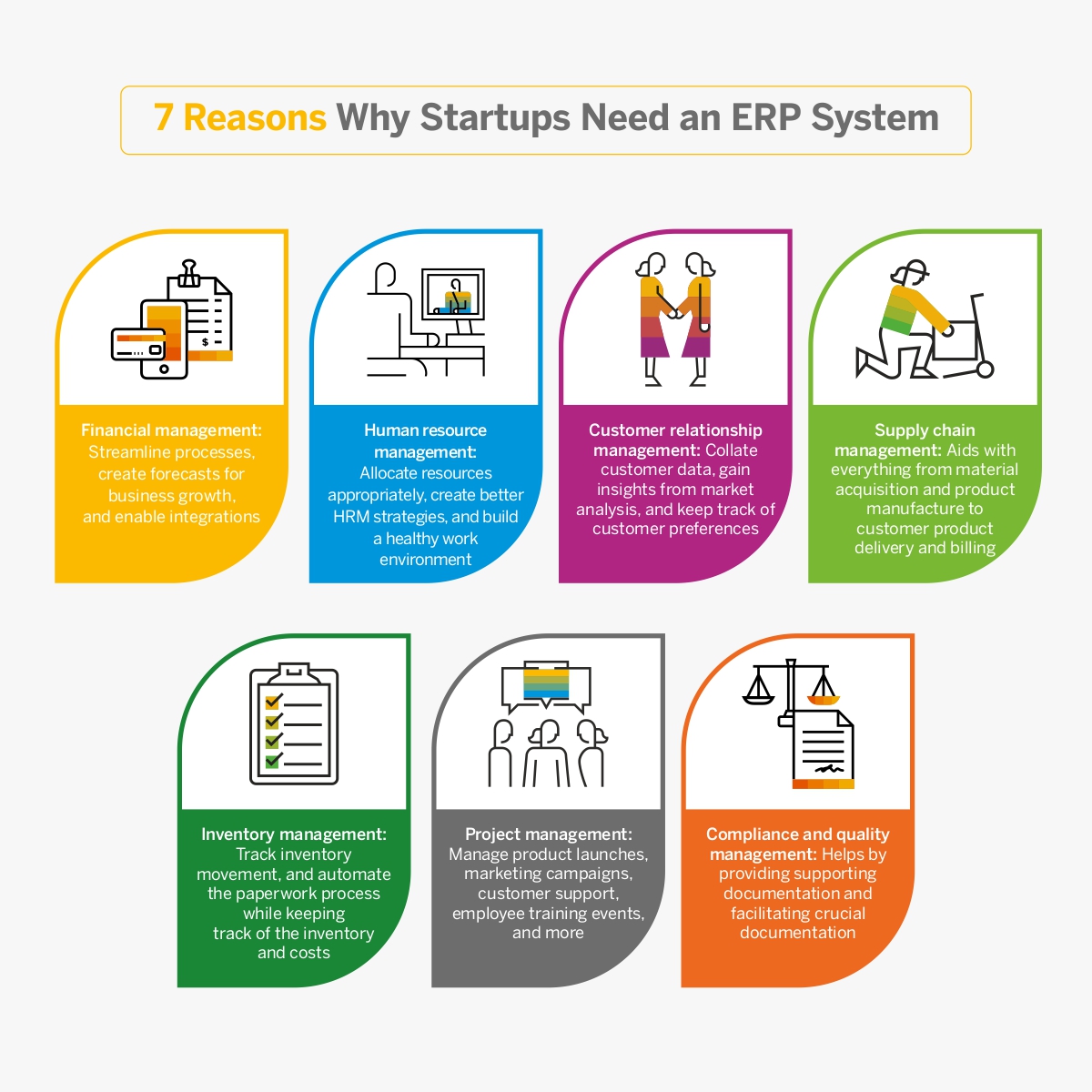Enterprise Resource Planning (ERP) systems help streamline and integrate all processes in startup firms in areas such as human resources, finance, logistics and compliance. From handling large data volumes to increasing an organization’s process and business efficiency, ERP systems have proved indispensable for business leaders.
As per research, the global ERP market is forecasted to grow at a CAGR of 9.8 percent during the 2022-2030 period.
However, the persisting myth around this software is that it is targeted at global, multinational corporations. While business behemoths can indeed leverage the benefits offered by an ERP, it is equally vital for smaller firms, especially startups. Let’s understand why.

Why do Startups need an ERP System?
Research indicates that the main reasons for organizations to implement ERP solutions are to increase efficiency (35%) and gain cost advantage (29%) – crucial factors for a startup looking to gain a foothold in the market. ERP systems help startups confront and tackle multiple challenges such as:
- Decision-making – The startup work environment revolves around quick decision-making to identify business opportunities and cash in on those. To do so, the leaders need to have access to reliable and disparate data from various departments that can provide a high-level snapshot of all the functions of the startup. This data can also be fed into the enterprise asset management and enterprise risk management systems, enabling decision-makers to take the right steps.
- Investment – Startups need investors to generate capital for growth. What attracts an investor to a business is a mix of many factors like customer base, revenue model, company structure, etc. The real investor looks into the internal processes too. They know that a business can succeed when it is process-driven and well-organized and prefer to place their money where it can be seen and easily monitored.
- Cost – Due to limited resources, especially in the early stages, cost is the most crucial consideration for startups. So, while they need tech solutions to organize and streamline their internal processes, the high cost of such software might be a challenge. Hence, there is a need for a solution that is inexpensive, scalable, and simple to use.
How do ERP Systems help Startups?
An ERP system collects and stores data from various business functions in a centralized location. By sharing standardized, accurate, and real-time information, an ERP system increases the efficiency in different departments of a business. Here’s how this happens:
- Financial Management – ERP systems can be used to monitor and track financial data. This includes data related to accounts payable, accounts receivable, budgeting, tax management, cash flows, profit, and loss among others. This streamlines the financial and accounting process, helps create forecasts for business growth, and also enables integrations with banks and financial institutions. For startup employees, ERP enables them to spend more time on data analysis for strategic decision-making.
- Human Resource Management– ERP systems provide valuable information to the HR department about their employees. This includes salary details, employee contact information, leave management, promotions and performance management, attrition rate, etc. This information will help leaders allocate resources appropriately, create better HRM strategies and work towards building a healthy work environment.
- Customer Relationship Management – Managing customers and keeping their needs in focus is a crucial differentiator between a successful startup and a not-so-profitable one. Startups must maintain a healthy customer relationship for future growth and increasing profitability. ERP systems help collate customer data of different departments, bringing uniformity in business replies to the customer and ensuring speedy responses or grievance redressals. An ERP system can also help with lead management, getting insights from market analysis, keeping track of customer preferences, and so on.
- Supply Chain Management – Supply chain management is the backbone of a company. This is even more true for a startup, which works on tight deadlines and requires partners and suppliers to provide it with the proper resources at the right time. A robust ERP system can aid the supply chain management process by handling everything from material acquisition and product manufacture to customer product delivery and billing.
- Inventory Management – Inventory is a crucial part of any firm, regardless of its size. ERP for startups allows them to track inventory movement throughout the supply chain. The enterprises can automate the paperwork process while keeping track of the inventory and costs.
- Project Management – Automating the project management process is important for startup founders, especially those hard-pressed for time. With the help of an ERP system, product launches, marketing campaigns, customer support, employee training events, etc can be managed.
- Compliance and Quality Management – In today’s environment, quality is not something that can be disregarded, especially when it comes to compliance. ERP will aid users with quality management in particular by providing supporting documentation and facilitating crucial documentation. All parts of quality control, from audits to SPC management, maybe automated with an ERP solution.

What to look for in an ERP?
With so many features and options to choose from, it can be difficult to determine which ones will best assist the firm in achieving its objectives.
ERP suppliers continue to expand their products, particularly those in the cloud, and they are increasing the sophistication of their offerings by adding artificial intelligence capabilities and advanced features. This complicates the process of selecting the best system. It’s particularly difficult for startups, which may not yet know what they need and are dealing with severe workloads and a lack of qualified staff to effectively select a new system.
While there is no one-size-fits-all ERP solution for every company, there are several critical considerations that most businesses should make. Before selecting the type of ERP system to invest in, make sure it has the following attributes:
- Budget-friendly: An ERP investment might be very costly. The cost of ERP solutions varies depending on the level of complexity you expect from your product and the number of people you need to service. Although an upfront investment may be the best option for some businesses, a startup’s limited budget and resources may benefit the most from a cloud-based subscription model.
- Scalable: It’s critical to have an ERP system that can scale with your business as it grows. Making an ERP investment that cannot be scaled due to changes in the market requirement for the firm is a bad idea, especially when working with a startup. ERP systems for startups will need to be able to accommodate changes in requirements and resources. ERP systems that are hosted in the cloud can be scaled to fit the needs of the organization.
- Simple: There are numerous ERP packages available, each with a bewildering array of capabilities such as built-in collaboration tools, task management, automated data upload, and more. Don’t opt for functions and features you don’t have a specific need for.
- Easy to use: In terms of efficiency, a user-friendly UI can make all the difference. Selecting a cloud ERP solution with a modern, clean design, a straightforward menu structure, and a logically arranged interface is crucial. Everything should be within easy reach, and you shouldn’t have to memorize a bunch of shortcuts just to finish your work.
- Trustworthy: Transparency is crucial in any organization, but it’s extremely important for your ERP solution to provide it. You won’t be able to trust the information in the system if you aren’t confident that your data will be adequately stored and secure. Make sure your ERP solution has a wide range of standard and bespoke reporting options, as well as sophisticated analytics built-in or available as an add-on, as part of this focus on data.
- Secure: Cybercriminals are a persistent threat to businesses of all sizes. A startup is no exception; the risk is increased in certain aspects because the firm is still growing, processes are being built and there are lesser staff and fewer resources. Many cloud-based ERP solutions include security safeguards; make sure your chosen solution makes data security simple.
- Responsive: Make certain that the ERP provider or partner can assist you at all times. A responsive support system will be required to assist you during the implementation phase, as well as to migrate and customize as needed. As a result, selecting a vendor or partner that provides excellent assistance is critical.
In Conclusion
It is up to the startup to determine whether to invest in the early days or once the funds and resources are in place. However, there is no denying the fact that deploying an ERP is no more a choice; it is a necessity. When it comes to startups, entrepreneurs are faced with the tough choice of selecting an ERP that balances limited resources with organizational goals and strategies.
The SAP Business One Starter Package is a cloud-based solution designed specifically for Micro, Small, and Medium Enterprises. Introduced as part of the ‘Global Bharat’ mission, the solution furthers SAP’s intent to make the MSME and startup business segment more future-ready with digitally enhanced technology and strategies.



